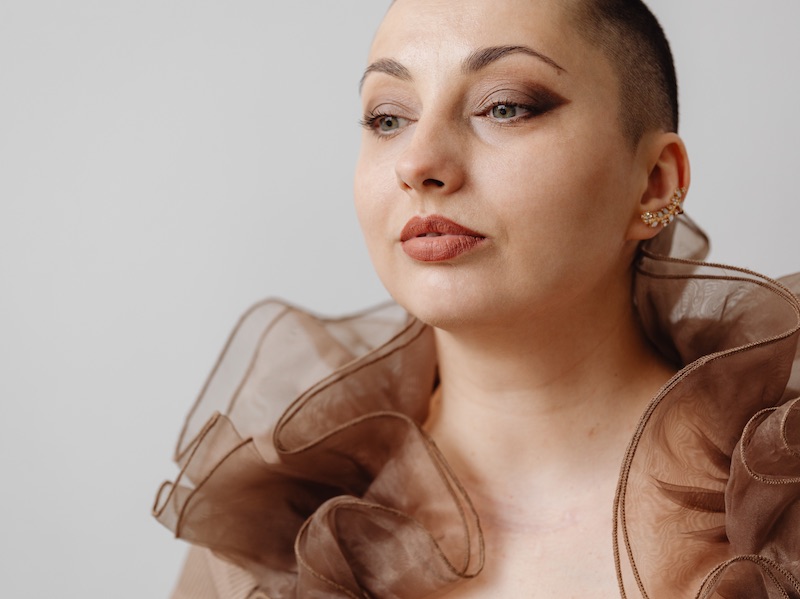The 2022 Oscars ceremony will go down in history as being anything but boring.
After comedian Chris Rock made a joke about Jada Pinkett Smith’s alopecia, a condition that causes the hair to fall out, her husband, Will Smith, walked onto the stage and slapped the presenter.
Returning to his seat, the actor, who went on to win the Best Actor for his performance in King Richard, shouted: “Keep my wife’s name out of your fucking mouth.”
Headlines around the world exploded with speculation as the international community held their breath for Smith’s apology, which later came.
But there’s another piece to this story.
A spotlight has been firmly shone on the hair care condition that has blighted 147 million people worldwide, according to the National Alopecia Areata Foundation, and it shows that there is a long way to go before the hair loss condition will achieve acceptance in the beauty industry.
Avon is one of the few beauty brands to have hired a member of the public with alopecia to appear as part of its HerStory fragrance campaign.
Christala Fletcher, a professional wig maker, meanwhile, was tapped by beauty name Monpure to act as its Hair Loss Ambassador.
Aside from Pinkett Smith, supermodel Tyra Banks and former Little Mix band member Jesy Nelson have opened up about their battles with alopecia.
But as an industry that has a ‘fix’ for every need, why are people who are suffering with alopecia being underrepresented?
“Since ancient times having healthy, luscious locks has always been associated with beauty, attractiveness, health and youth,” Sharon Wong, a consultant dermatologist and hair specialist, tells Cosmetics Business.
“Whilst the devastating impact of alopecia-related hair loss can also affect some men to the same degree as women, it is generally less common to see women with hair loss publicly.
“For this reason far more women who experience hair loss will have feelings of shame, unattractiveness, social anxiety and poor self esteem, and the condition definitely deserves to be spoken about more publicly, both to help castaway shame and to help sufferers recognise the signs.”
She adds: “Increasingly we are seeing brands stand up and take note of hair and scalp care (largely due to the skinification of hair trend), however there are such a diverse range of hair issues that are experienced differently by everyone and for different reasons – that education is key.
A collective responsibility
Tori Rosero, is a SPMU Artist and founder of Glowblade Academy, a semi-permanent make-up academy. She says that she often has women come into her clinic that suffer from alopecia.
“The results last at least 12 months with top ups recommended annually; it’s a low maintenance, waterproof solution to brow loss,” she says.
But, she’s not convinced there’s enough representation around people living with alopecia.
“I think that although there are confidence boosting beauty solutions for people who have alopecia or have experienced hair loss from chemotherapy, there’s not enough awareness around this.
“There are also fewer beauty therapists who are experienced in working with people who have conditions like alopecia.
“It’s important to manage the expectations and emotions of people who have alopecia, as if you haven't had eyebrows for a while it could be quite a shock and adjustment to then see yourself with brows.
“This is something that beauty therapists need to be aware of and carefully manage.”

Alopecia affects 147 million people worldwide
Not only that, CEO of Alopecia UK, Sue Schilling, says that beauticians and hairdressers have an important role to play in helping spot signs of alopecia.
“Alopecia is a little-known condition, and it is often hairdressers or beauticians that notice the loss of hair from the head, eyelashes, or eyebrows, even before the person with alopecia,” says Schilling.
“So, the biggest thing we ask of professionals is to make themselves aware of what alopecia is, understand the psychological impact, and signpost people to get advice from the GP, and also to our website, Alopecia UK.”
Industry responses
Wong has her own initiative that helps provide support for people suffering from hair loss conditions.
Get Ahead of Hair Loss began as an educational event, backed by leading dermatologists, trichologists and hairdressers, offering programmes for those experiencing hair loss.
While her 2020 event was cancelled due to the pandemic, Wong says that the team are working hard to develop an online resource.
TalkHealth is another outlet that helps consumers deal with health conditions.
Articles, product reviews and support programmes can be accessed via its website, talkhealthpartnership.com.
In partnership with TalkHealth, the British Skin Foundation has also developed a forum whereby consumers can meet to discuss their skin conditions and share tips.
These initiatives give hope that people suffering with alopecia can get the support they need.
But now it’s up to the industry to widen its representation to include those that are suffering with hair loss conditions.



